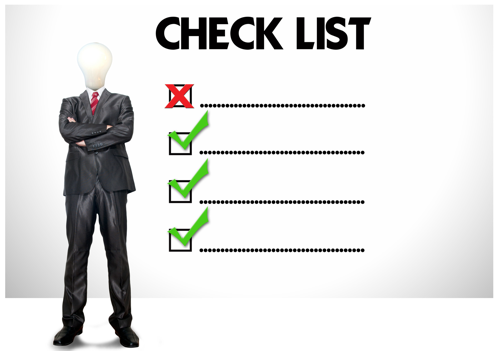Your Training Checklist
Your training dollars are precious.
They have the potential to bring you an amazing and immediate return when invested properly. Few other areas of corporate investment provide as many benefits across such a wide range. Efficiency, productivity gains, increased staff morale, higher employee retention, and a more flexible workforce are just some of the benefits an investment in training will bring you.

However, just as any investment broker will tell you, it’s where you invest your money that determines the return you will receive.
When investing your hard earned dollars in training staff you need to be assured you are investing them where they offer the best chance for those desired gains. Not all training companies are the same – and not all trainers are as effective as you might think.
In my 20-plus years of business-focused, adult-oriented training I’ve been privileged to work with, and observe, some of the best in the business. Allow me to share some items which may form part of your training checklist when you consider where to invest:
Is the trainer experienced and qualified?
One would expect such is the case. Aren’t all trainers qualified?
Unfortunately the answer is NO – and you’d be amazed how inexperienced some are too.
I’ve come across many horror stories about trainers literally learning about the subject just a short time before they deliver their class lecture. Often their ‘lessons’ come direct from a manual or book you could have purchased yourself for next to nothing.
Effective training needs a qualified trainer, one who is experienced in identifying topics that will give you the most benefit.
 Will the trainer work with you before the class?
Will the trainer work with you before the class?
Working directly with the trainer, well in advance of the course, allows them to better understand what your business actually needs from the training. You can usually anticipate that if there’s no advance consultation with the trainer then what you’ll get is a ‘cookie cutter’ course delivered just as the manual says – whether that’s right for you or not.
Are you being told you should also do level 1, level 2, and level 3 of a certain subject?
That’s a great way for a bogus trainer to avoid the pre-course consultation. It also guarantees that in order for you to learn the subjects you want – you will have to take a whole bunch that you don’t want or need. At full cost to you of course!
Are you getting ‘off the peg’ training but paying for ‘tailor made’ when it should be the other way around?
 What methodology will they use?
What methodology will they use?
Don’t be afraid to ask what methodology your trainer will use during the course(s). A quality trainer will be only too happy to explain their techniques.
If the trainer (or the sales staff selling you the course) can’t tell you exactly the methods they are going to employ then you really are in limbo as to your training outcome. A qualified trainer should arrive in class with a large array of techniques, tools, and methods they can draw on when needed to ensure maximum retention and understanding from the students.
- Ask how they will deal with different learning styles?
- How will they ensure topics taught can be utilized immediately in the workplace,
- etc, etc?
If they can’t name the methodologies they are going to implement, and can’t prove they are qualified in them – your training investment is likely to be a very speculative one.
 What is the support policy?
What is the support policy?
Any trainer who tells you they are going to cover everything you need in the training session, or that you will remember it all afterwards – is giving you a sales pitch! One of the aims of a good trainer is to introduce the training delegate to areas of the software that they may not have considered before.Tweet this
If they do this – questions following the course are both inevitable and (more importantly) desirable – as you explore the benefits of your new found skill.
A good training company will always offer support designed to ensure students have access to any further skills or knowledge they need. If the training company is worth its salt, this will be free of charge!
 Are you being charged fairly?
Are you being charged fairly?
There’s an old saying, “If you pay peanuts then you’ll get monkeys,” however, overpaying is just as bad. Training budgets are fragile, precious things and companies deserve to have a realistic expectation that their budgets will stretch a reasonable distance. The stark truth is that many training companies have been steadily driving up the cost of training for a number of years now. It’s not unusual to be paying between $2,500 and $3,000 to receive one day of good quality training. This is doing nothing other than drive business owners towards paying lower fees for inferior training of their staff.
As someone who has passionately believed in the training industry for more than 20 years, and believes training should be an affordable commodity, this makes me very disappointed. Prices I’ve seen quoted recently from some training companies are between 30-50% above what they should be.
Are you paying for someone else’s overheads and inefficiencies?
Whoever you use for your training needs
(and everyone needs training)
– make sure your investment is sound and one that will guarantee you the best return!
Barrie Morse is a business trainer with more than 20 years experience in Microsoft products. He was the first Microsoft Master Instructor in Europe and is authorized to deliver their approved Train-the-Trainer course. He has delivered courses to many of the top 100 companies in both Europe and North America.
What is the most important factor for your decision?


2 Responses to “Your Training Checklist”